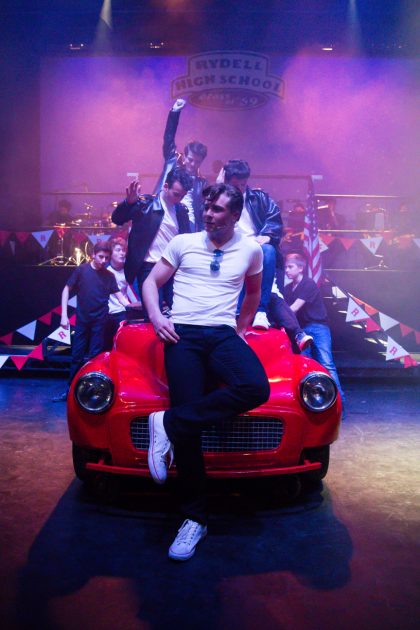The start of the Easter holiday and the first three days have been spent catching up with family, getting back in the saddle for a mountain bike bash at Gisburn and slowly processing the events of fast paced spring term. To be honest, I tried to do justice to all that has been achieved in and out of the classroom, on many trips, over the course of numerous sporting fixtures, and on the stage – but I only scratched the surface of the multi-faceted and busy School that is BGS.
Three recent events stand out. Our Senior School show ‘Grease’ was superb. A tremendous effort from students and staff – actors, band, and crew – brought great entertainment to the Hockney Theatre for three sell-out shows. A little risqué in places as I listened to some of the lyrics for the first time (what was that you sung Henry?). The whole show was lots of fun for the audience and for everyone taking part – smiles and laughter were in plentiful supply.
That same sense of joy was evident once more a few days later at the ‘Spring Concert’. Once again it was my pleasure to say a few words at the end of the performance and I think my enthusiasm for the performing arts at BGS was back on display – it’s hard not to wear your heart on your sleeve in such moments particularly when the soon to be leaving upper Sixth Form were taking a final bow on stage.
Then Clock House Juniors were up performing on the same stage during the last week of term for their ‘Spring Concert’ showing us all that BGS has talent in depth at all ages (and also that Mr Paul ‘Darth’ Smales and Mr Chris Brook are not to be taken lightly with Star Wars light sabres). Great stuff.
The arts are full of life at BGS but, half an eye on the educational press is enough to give anyone a sense that they are being squeezed elsewhere in the nation’s schools. A tweet from the recent NASUWT conference protested that the ‘EBac and Progress 8 started an act of educational vandalism by reducing the role of arts in schools’, giving focus to mounting fears that these Department for Education (DfE) accountability measures will lead to ‘creative’ subjects being squeezed out of the curriculum. The central concern is that Art, Music and Design and Technology are not EBac subjects and might be ignored in order to advance a school’s league table position.
This week the headline in the TES ‘Arts subjects seen as a ‘hobby’ and could be wiped out in some schools, teachers warn’ did little to take away worries and poured cold water on the enthusiasm of Government and their £285m additional spend to extend the school day to provide Art, Drama and Music clubs, reducing them potentially to peripheral hobbyist subjects, extra-curricular activities only. Independent schools like BGS are passionate about providing a broad and balanced curriculum where creative subjects are part of the core offering, but the headlines continue to make teachers nervous.
We have celebrated and advocated on behalf of the arts in recent assemblies. The perceived erosion of the arts has been characterised as an attack on creativity in schools – and I have to agree. But I believe that fostering creativity is not the sole preserve of arts-based subjects and I’m a little surprised that the humanities and sciences have been quiet on this point.
Rummaging around in my own experiences of doctoral earth science research I recounted to our students how Glaciologist Dr Doug Benn applied techniques from civil engineering to prove that ice sheets in Patagonia had been able to exert sufficient force to deform and bulldoze frozen sediments at their margins, a creative resolution that explained some puzzling and unexplained landforms.
Additionally, I explained that creativity was also at play when Geophysicist, and former Astro-physicist, Dr Bernard Chouet, learnt to interpret hidden signals in traditional seismographs to help predict eruptions. It was Chouet’s understanding of music and resonance, and the creative application of that knowledge in another field that was striking. And creativity is also evident in STEM subjects in School, whether that is problem solving in Maths or the explanation of expected or unexpected results in experiments.
Arts subjects are under threat nationally but thankfully not at BGS.
Our subjects provide a superb platform for fostering creativity amongst many other qualities and are encouraged as part of a balanced classical education. All subjects make a contribution to creativity in schools. The key thing is how the curriculum is taught and delivered. If learning is active and encourages thinking, not just consumption of information, and if informed risk-taking can be nurtured to find new solutions to problems, then creativity will always be encouraged. And it certainly is at BGS.
“Arts subjects are under threat nationally but thankfully not at BGS. Our subjects provide a superb platform for fostering creativity amongst many other qualities and are encouraged as part of a balanced classical education. All subjects make a contribution to creativity in schools.”
